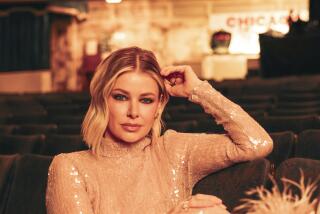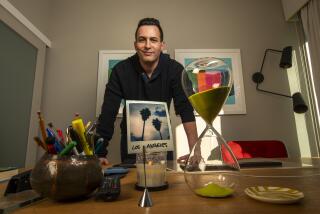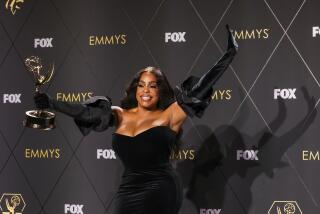‘RuPaul’s Drag Race’ tackles real-world issues — when it isn’t busy launching memes
Ten seasons in, it’s remarkable how “RuPaul’s Drag Race” continues to challenge television’s historical norms. Programs at this stage rarely if ever increase their ratings or relevancy, but this year the Emmy-winning reality competition series has beaten the odds while tackling issues such as racial prejudice and sexual assault. It’s also, on an entertaining note, led to one of the biggest social media memes of the year, “Miss Vanjie.”
For those curious just what “Miss Vanjie” meant as it popped in your Twitter or Facebook stream, at the end of the first episode of Season 10, Vanessa “Vanjie” Mateo lost a lip-sync competition. After hearing RuPaul Charles’ iconic dismissal “Sashay away,” the 25-year-old Tampa-based drag queen walked backward down the runway saying “Miss Vanjie, Miss Vanjie, Miss Vanjie” in a seductive manner as a quizzical RuPaul looked on.
Not only did the image and phrasing explode across the Internet, but it was so memorable that it organically appeared in future episodes. RuPaul notes the meme was “way bigger” than he initially thought it would be.
WATCH: Video Q&A’s from this season’s hottest contenders »
“In the moment, it was funny that she said that and then it was just odd it stuck out,” RuPaul says. “So on the judges’ panel, Michelle [Visage] and I made a thing out of it. We didn’t know that the girls backstage were also making a thing out of it. It’s just one of those quirky things because we knew of the term ‘banji’ [a woman acting trashy], you know? And then when she said ‘Vanjie,’ we thought, ‘Wait a minute, did she misinterpret that word or is she just being funny?’ I don’t think the public at large really took it in that way, though. I think they were responding [that] phonetically it’s a funny word, but also the way Michelle and I reacted to it.”
As he has every other season, RuPaul handpicks contestants such as Mateo from thousands of submissions based on their “charisma, uniqueness, nerve and talent.” RuPaul notes, “We’re looking for people who are uniquely themselves. That’s what makes the show interesting. That’s what gives the show its life’s blood.”
This particular season another memorable contestant, the Vixen, sparked a discussion on racial perception that has rarely been given a serious platform on non-narrative television. The 26-year-old Chicago native insightfully pointed out that if she continued to debate a topic with a Caucasian contestant, New York City-based Aquaria, it would be perceived as an attack and perpetuate the “angry black woman” stereotype. It came as no surprise to RuPaul that two drag queens would be at the center of such a thought-provoking discussion.
“Queens are always at the forefront of every issue,” RuPaul says, “because our job as drag queens is to remind culture to not take itself seriously, to remind culture what is really happening. We’re like the mirror of culture because we’re basically mocking culture. We have the opportunity to point things out and say, ‘This is something you should look at. This is something that is important.’”
Moreover, RuPaul says drag has always been political, but not necessarily about specific policies or marching in the streets, although drag queens continue to make their mark in those areas. He notes, “I’ve said, for many years, ‘Every time I bat my false eyelashes, I’m making a political statement.’ It’s true. Because I’m challenging everyone who’s looking at me or who’s watching the show to question their choices and who they think they are and what’s real, what’s not real.”
VH1 expanded “Drag Race” to 90 minutes per episode along with bringing back its companion series, “Untucked,” to the network after three years on YouTube, where it earned an Emmy nomination in the outstanding unstructured reality program category last year, bringing the show a larger overall audience. And now a whole new global audience is also discovering the show for the first time on Netflix and other streaming services.
RuPaul laughs and says audiences’ “heads are exploding, because they had no idea that this was happening for the past 10 years. It mirrors so much of the human experience on this planet.”
The reigning two-time winner in the reality host category, RuPaul says his favorite part of the job is meeting the fiercely determined kids who come onto the show.
“They had it from their parents, other kids in the neighborhood, the church, the government,” RuPaul says. “Everyone in the world. Even other gay people said, ‘You can’t do that. You won’t get money. You will be left alone.’ That’s my … tribe right there and I want to be with my tribe.”
More to Read
From the Oscars to the Emmys.
Get the Envelope newsletter for exclusive awards season coverage, behind-the-scenes stories from the Envelope podcast and columnist Glenn Whipp’s must-read analysis.
You may occasionally receive promotional content from the Los Angeles Times.






